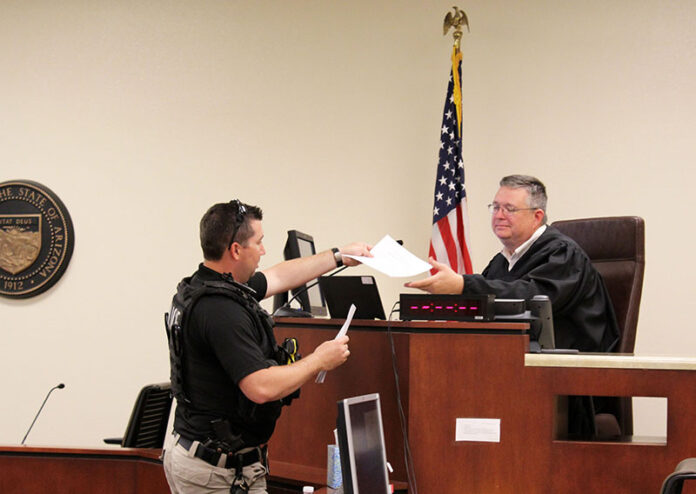
By Michelle Chance
Pinal County Justice Courts are addressing an on-going issue: People who fail to show up for court.
County statistics show among all eight justice courts in 2015, there were nearly 3,000 warrants issued that included failure to appear charges. In 2016, that number lowered by less than 3 percent to 2,838.
It’s a problem that doesn’t go away – and putting it off can cause real problems.
Maricopa/Stanfield Justice of the Peace Lyle Riggs said he believes many people don’t understand the negative impact ignoring a court date can have on their lives.
“All too sadly they find out there are real consequences, and then they’re really quite angry,” Riggs said.
Failing to appear has a snowball effect on a person’s legal issues and often include higher fines, arrest warrant issuance and revoked driving privileges. Read Judge Riggs’ opinion.
“You can take a relatively simple speeding ticket that might be a $200 fine and turn it into a $3,000 problem very quickly,” Riggs said.
The problems don’t stop there.
In criminal cases, if a defendant is picked up on a warrant for failing to appear, they will spend a night or more in jail. That can have lasting effects on a person’s ability to get and retain a job.
Judges complain the issue can be easily avoided. Shaun Babeu, justice of the peace in Apache Junction, said communication is key.
For example, the courts accept written requests for things like court date extensions – and although judges said they cannot guarantee all requests will be approved, dialogue with the court goes a long way.
“We are not looking to put people in jail. We are looking to get their case resolved, get them back on track and pointed in the right direction,” Babeu said.
New Automated System Means Shorter Grace Period
Historically, many courts have given people who fail to appear one to two weeks to come into court. However, a new automated system is changing that and consequences are being applied sooner.
Implemented statewide in December, the Arizona Judicial Automated Case System immediately notifies court staff when someone fails to appear. It can also send a notice to the Motor Vehicle Division to suspend licenses and registrations.
Casa Grande Justice of the Peace John Ellsworth said he has seen an increase in the number of motions coming into his court from people requesting their licenses be reinstated since the system was put in place.
“I believe that we are getting on to them a lot quicker because the automated system is a lot more efficient,” Ellsworth said.
The system is still being phased in at the Maricopa court. However, Riggs said the typical grace period people have to seek resolution after missing a court date will soon be shortened significantly. He said it is even more of an incentive for people to show up to court on time.
Open Court Provides Options
Until no-shows are no longer a problem, judges continue to give people an opportunity to get back on track.
In the Apache Junction court, the busiest in the county, Babeu has implemented warrant resolution days giving defendants an opportunity to resolve issues with their cases.
For the first time, the Maricopa/Stanfield court will hold a similar event on Saturday, May 20, from 7:30 a.m. to 2:30 p.m.
But opportunity for resolution is not a new practice in Maricopa. In fact, for the past two years Riggs has reserved 30 minutes every Friday morning for “open court” where people can speak to the judge for a variety of issues, including those who have missed a court date and have been issued a warrant.
In March, Riggs extended his open court to every weekday morning from 8:30 to 9. He said the open court is working.
On one Friday morning in late March, more than 20 people filled his courtroom. Civil traffic offenses dominated the cases brought to the judge. Riggs also heard from people who failed to appear at their original court date and were looking to resolve their cases.
He said he hopes to see more of them.
“My hope, truthfully, is that I get a flood of people coming in,” Riggs said.
This story appears in the May issue of InMaricopa.

![Shred-A-Thon to take place tomorrow An image of shredded paper. [Pixabay]](https://www.inmaricopa.com/wp-content/uploads/2024/03/shredded-paper-168650_1280-218x150.jpg)






![Elena Trails releases home renderings An image of one of 56 elevation renderings submitted to Maricopa's planning department for the Elena Trails subdivison. The developer plans to construct 14 different floor plans, with four elevation styles per plan. [City of Maricopa]](https://www.inmaricopa.com/wp-content/uploads/2024/04/city-041724-elena-trails-rendering-218x150.jpg)





![Shred-A-Thon to take place tomorrow An image of shredded paper. [Pixabay]](https://www.inmaricopa.com/wp-content/uploads/2024/03/shredded-paper-168650_1280-100x70.jpg)


